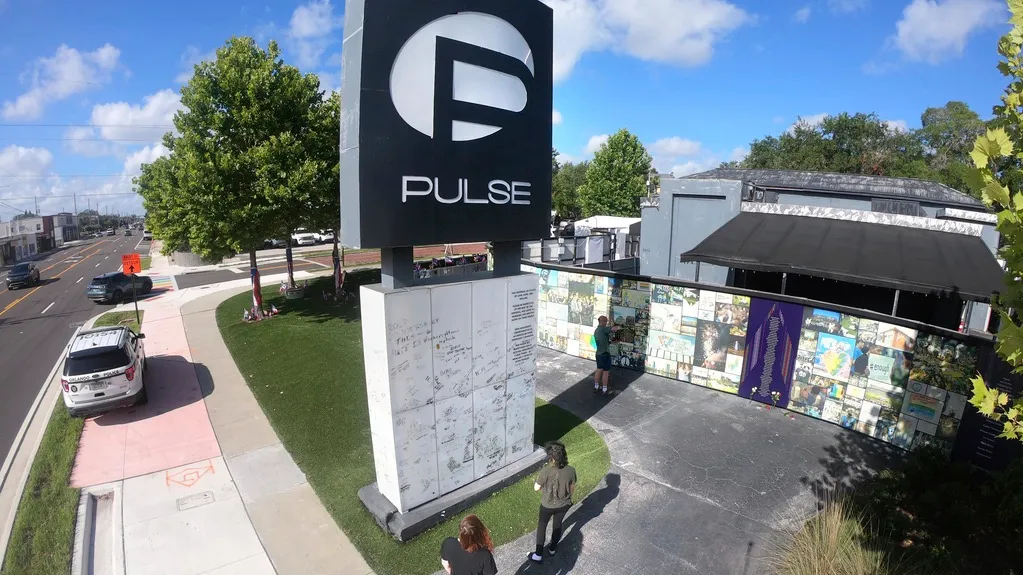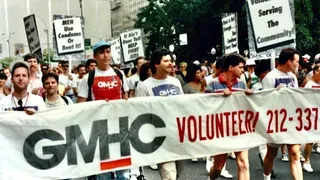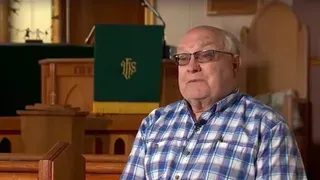January 8, 2016
Trans Activist Michaela Mendelsohn Joins Board of Trevor Project
Winnie McCroy READ TIME: 9 MIN.
After competing in the Ms. Senior California Pageant and serving as a consultant to Jenji Kohan in the development of Laverne Cox's character on "Orange is the New Black," most people would be content to rest on their laurels. But not Michaeala Mendelsohn. This beauty dove right in to the important work of keeping our LGBT youth safe, becoming the first transgender board member of The Trevor Project.
And it wasn't just for show; this Southern Californian parent of three grown children (plus a two-year-old son with her partner Carmel) recently accepted a position with Trevor, and is on three standing committees there: Finance, Programming and Board Development. She brings with her the experience gained as a businesswoman with over 40 years of entrepreneurial leadership experience, currently serving as the CEO of Pollo West Corp, one of the largest franchisees for El Pollo Loco restaurant in the Western Region of the United States.
Mendelsohn also part of their Southern Initiative, studying ways to introduce The Trevor Project's services in the South, where the cultural and religious divide is a major barrier. Mendelsohn also works with the California Trans Workplace Project, forming a coalition with several other organizations, to promote transgender employment opportunities.
EDGE spoke with Mendelsohn recently, and she told us why it's important to keep our kids safe, and provide good jobs for transpeople.
EDGE: How did you go from the first trans contestant in Ms. Senior California to the first trans member of The Trevor Project?
Mendelsohn: My vision is helping the community more from the bottom up, because there's a lot happening that's helping the trans community on a white-collar level, but transwomen of color, especially Latin and Black, are really where I see tremendous amounts to be done, especially in some areas of the country. My vision is to see our lives normalized, so that transwomen can be on a fair and equal footing socially, economically, with an ability to acquire and hold down good jobs, and raise families. Because really there are thousands of transpeople raising families that will change the world one day. I have a two-year-old myself!
EDGE: What barriers did you face in the pageant?
Mendelsohn: Being in something like the Ms. Senior California was a bit of ego to show off my new body -- but I also like to pioneer things that are seen as cisgender, and create breakthroughs. So I enjoyed that experience very much.
EDGE: What do you bring to the board of Trevor?
Mendelsohn: They are very serious, and the work they do is amazing. When the CEO Abbe Land approached me to be their first trans board member, I was very excited. I went through a long interview process by different members of the board, and as that process developed, I learned more and more about the organization. I immediately joined three committees and one initiative.
EDGE: Why be on three committees?
Mendelsohn: I joined the Finance Committee because I have over 40 years experience running my own business [Pollo West Crop.]. I also joined the Program Equality Committee and the Board Development Committee, and became part of the Southern Initiative, a special program to break through in the South. Over 35 percent of our crisis calls are coming from the South. We know it's a cultural divide, with religious issues that make it difficult for trans youth, who are not as supported by their family. All I know is if LGBT children are not supported, they are eight times more likely to commit suicide.
EDGE: Tell us about the Southern Initiative. What is the strategy?
Mendelsohn: It's in the beginning stages, and we're identifying a half dozen initiatives to best reach the youth in that area of the country, and let them know what Trevor offers. There's not only crisis call counseling, but also Trevor Chat and Text, and we are developing those significantly so kids have the chance to help each other. We want to find the most effective way to reach them. It's a bit challenging because some areas will be more helpful to us reaching them, schools and universities, GSAs and churches. Working w churches, problem is starting to let in gays and lesbians, but roadblock to trans.
EDGE: Tell me about Trevor's crisis training program?
Mendelsohn: I'm new to the project; I've only been on the board for three months, but I jumped in with both feet because I think I bring them a connection to the trans community. Because trans calls are increasing, and I really want to focus on that. I signed up for the March 40-hour Crisis Training workshop, which is not required of board members, but I thought it was important to understand how that works, because transgender people experience crisis different than gays or lesbians. It's based on a different set of triggers that can be very sensitive; 41 percent of trans people have attempted suicide, and hopefully that number is dropping, but there are hair triggers that I would like to better understand.
EDGE: What about your work with California Trans Workplace Project? Tell us about this coalition.
Mendelsohn: It was my brainchild, my organization that I've just founded, and it comes out of my experience in the workplace as an employer. So far the Transgender Latino Coalition has joined, plus The Trevor Project, and the LA LGBT Center. Four years ago a transwoman came to work with us, and I sat down to talk with her; I had 400 employees then. She told me her story about being a Taco Bell worker, and the franchise manager told her she could only use the men's restroom, where she was molested. Then she was told she could only use the single-stall women's restroom. But one day a woman walked in behind her and told her husband that a man tried to sneak in, and she was fired. This was a year and a half later, otherwise I would have gone right to Lambda Legal, so they could educate the employees that they were breaking the law. I've owned 20 restaurants in my time, and she's now the top trans manager in my best restaurant. I have nine transgender workers, and they get more compliments by customers by far, so much that I want to interview some customers in a 'Success Reel' and go to Chambers of Commerce in California to promote our state as a truly trans-friendly workplace.
EDGE: Tell us a bit about your documentary "Making Michaela."
Mendelsohn: That was a play that I wrote several years ago, and in 2013-4 it had two staged readings at Celebration Theatre in LA. We got a large crowd and were interested in workshopping and producing it, but I had to put it on the shelf because I had so many things on my plate -- taking care of a family with three grown kids and a two-year-old, it began to feel a little ego-centric. But I hope to pull it off the shelf and find a director someday.
EDGE: Why is it so important that transpeople get good jobs?
Mendelsohn: So much starts with making money to support ourselves. Transwomen, especially those of color, are twice as likely to be living in poverty, and 400 times more likely to experience violence in their lifetime. But if they can hold down decent jobs and make a good living, they're gonna have a lot more power to take control of their lives and not have to... do things they'd rather not be doing to get money for surgery, hormones, or just to live day to day. I want to be able to help them expand their vision -- it's too narrow now, too worried about day-to-day survival. They need a normalized, broader lifestyle to enjoy a full life. I was terribly bullied as a child, had significant issues with my friends and family and attempted suicide, and so I have some empathy, and that's one of my motivations.
EDGE: Tell us about your work as CEO of Pollo West, and the Christmas charity event you did there?
Mendelsohn: Pollo West is my corporation I started in April 1988. It's mostly a Southerwestern chain with 450 stores that just went public in the last year. It's one of the most successful IPOs this year. I owned it at one time and had 18 stories, but cut back to just six. I'm starting to grow it again as I get other things under my feet. For nine years I was president of the franchise, before my transition. Helping franchisees and the company and being on all the major committees gives me a great base to help others.
EDGE: How did you work with Jenji Kohan to develop Laverne Cox's character in Orange?
Mendelsohn: It was a novel and thrilling experience for me! Four years ago I was approached before the series, when Jenji was wrapping up "Weeds" and developing "Orange." One of her head writers was a friend of mine, and Jenji asked for help with this role in the book; she wanted to expand it in the show, so she called me and I brought a friend of mine with 22 years on the LA SWAT team before her transition. We spent hours with them in the Johnny Carson Studio Building, then several conversations with a writer assigned with the role and helped her understand the trans experience, dealing with family and friends and personal struggles, and help them understand that many of these late transitioners had macho male professional lives to try and overcome. It's just so close to what I and many friends have gone through. Like Sophia, I still have a relationship with my wife, although we're separated, and a rocky relationship with my children, although it's still there. We helped them developer her backstory as fireman, which worked out well because Laverne Cox has a twin brother who plays that role. I asked for no money or credit, just that Jenji hire a trans actress for this role, and ask me to help her get it right. And she did.
For more information, visit https://www.facebook.com/michaela.mendelsohn
Winnie McCroy is the Women on the EDGE Editor, HIV/Health Editor, and Assistant Entertainment Editor for EDGE Media Network, handling all women's news, HIV health stories and theater reviews throughout the U.S. She has contributed to other publications, including The Village Voice, Gay City News, Chelsea Now and The Advocate, and lives in Brooklyn, New York.





